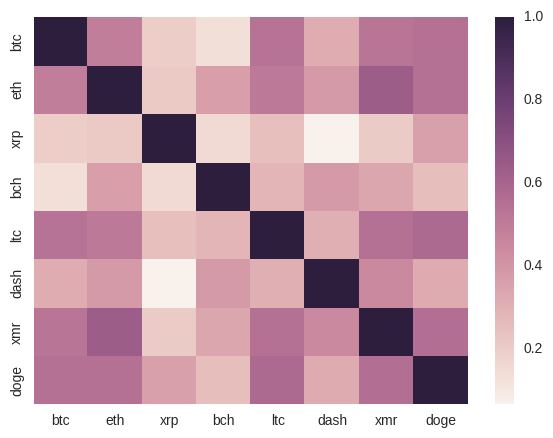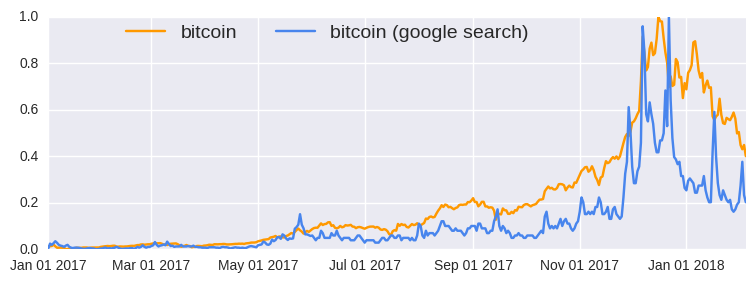Retrieve historical cryptocurrency and other related data.
cryptory integrates various sources of historical crypto data, so that you can perform analysis and build models without having to worry about knowing different packages and APIs. Current data sources include:
- Daily historical prices
- Additional cryptocurrency information (transaction fees, active adressess, etc.)
- Reddit metrics (e.g. subscriber growth)
- Google Trends (via Pytrends)
- Stock market
- Foreign exchange rates
- Commodity prices
$ pip install cryptory- Python 2.7+
- Python 3
- pandas>=0.23.0
- numpy>=1.14.0
- pytrends>=4.4.0
- beautifulsoup4>=4.0.0
Consult the documentation help(Cryptory) for more information on its usage.
# load package
from cryptory import Cryptory
# initialise object
# pull data from start of 2017 to present day
my_cryptory = Cryptory(from_date = "2017-01-01")
# get historical bitcoin prices from coinmarketcap
my_cryptory.extract_coinmarketcap("bitcoin")# get daily subscriber numbers to the bitcoin reddit page
my_cryptory.extract_reddit_metrics(subreddit="bitcoin",
metric="total-subscribers")# google trends- bitcoin search results
my_cryptory.get_google_trends(kw_list=["bitcoin"])# dow jones price (market code from yahoo finance)
my_cryptory.get_stock_prices(market="%5EDJI")# USD/EUR exchange rate
my_cryptory.get_exchange_rates(from_currency="USD", to_currency="EUR")# get historical commodity prices
my_cryptory.get_metal_prices()As all cryptory methods return a pandas dataframe, it's relatively easy to combine results and perform more complex calculations.
# generate price correlation matrix
import pandas as pd
import seaborn as sns
import matplotlib.pyplot as plt
all_coins_df = my_cryptory.extract_bitinfocharts("btc")
# coins of interest
bitinfocoins = ["btc", "eth", "xrp", "bch", "ltc", "dash", "xmr", "doge"]
for coin in bitinfocoins[1:]:
all_coins_df = all_coins_df.merge(my_cryptory.extract_bitinfocharts(coin), on="date", how="left")
# date column not need for upcoming calculations
all_coins_df = all_coins_df.drop('date', axis=1)
corr = all_coins_df.pct_change().corr(method='pearson')
fig, ax = plt.subplots(figsize=(7,5))
sns.heatmap(corr,
xticklabels=[col.replace("_price", "") for col in corr.columns.values],
yticklabels=[col.replace("_price", "") for col in corr.columns.values],
annot_kws={"size": 16})
plt.show()# overlay bitcoin price and google searches for bitcoin
btc_google = my_cryptory.get_google_trends(kw_list=['bitcoin']).merge(
my_cryptory.extract_coinmarketcap('bitcoin')[['date','close']],
on='date', how='inner')
# need to scale columns (min-max scaling)
btc_google[['bitcoin','close']] = (
btc_google[['bitcoin', 'close']]-btc_google[['bitcoin', 'close']].min())/(
btc_google[['bitcoin', 'close']].max()-btc_google[['bitcoin', 'close']].min())
fig, ax1 = plt.subplots(1, 1, figsize=(9, 3))
ax1.set_xticks([datetime.date(j,i,1) for i in range(1,13,2) for j in range(2017,2019)])
ax1.set_xticklabels([datetime.date(j,i,1).strftime('%b %d %Y')
for i in range(1,13,2) for j in range(2017,2019)])
ax1.plot(btc_google['date'].astype(datetime.datetime),
btc_google['close'], label='bitcoin', color='#FF9900')
ax1.plot(btc_google['date'].astype(datetime.datetime),
btc_google['bitcoin'], label="bitcoin (google search)", color='#4885ed')
ax1.legend(bbox_to_anchor=(0.1, 1), loc=2, borderaxespad=0., ncol=2, prop={'size': 14})
plt.show()cryptory relies quite strongly on scraping, which means that it can break quite easily. If you spot something not working, then raise an issue. Also, if you have any suggestions or criticism, you can also raise an issue.

